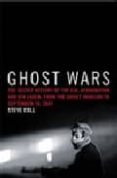 |


|
 |
GHOST WARS: THE SECRET HISTOY OF THE CIA, AFGHANISTAN AND BIN LAD EN, FROM THE SOVIET INVASION TO SEPTEMBER 10, 2001
|
Autore
|
 |
COLL, STEVE
|
Editor
|
PENGUIN PRESS, USA
|
Isbn
|
9781594200076
|
Fecha pub.
|
2004
|
Clasificación
|
Politica Internacional
|
Precio
|
€ 38,95
|
Looming large in the minds of the American people since the devastation of September 11, 2001 - and perplexing their political analysts, media, and elected leaders - are two unsettling questions: To what extent did America’s best intelligence analysts grasp the rising threat of Islamist radicalism? And, Who tried to stop bin Laden and why did they fail? Later this month, and for the first time, Steve Coll, managing editor of The Washington Post, provides answers in a news-breaking account of the CIA’s involvement in the covert wars in Afghanistan that fueled Islamic militancy and gave rise to bin Laden’s al Qaeda. For nearly the past quarter century, while most Americans were unaware, Afghanistan has been the playing field for intense covert operations by U.S. and foreign intelligence agencies-invisible wars that sowed the seeds of the September 11 attacks and that provide its context. From the Soviet invasion in 1979 through the summer of 2001, the CIA, KGB, Pakistan’s IST, and Saudi Arabia’s General Intelligence Department all operated directly and secretly in Afghanistan. They primed Afghan factions with cash and weapons, secretly trained guerrilla forces, funded propaganda, and manipulated politics. In the midst of these struggles bin Laden conceived and then built his global organization. Pulitzer Prize-winner Coll provides the only comprehensive account to date of the secret history of the CIA’s role in Afghanistan, including its covert program against Soviet troops from 1979 to 1989, and examines the rise of the Taliban, the emergence of bin Laden, and the secret efforts by CIA officers and their agents to capture or kill bin Laden in Afghanistan after 1998. Based on extensive firsthand accounts, Ghost Wars is the inside story that goes well beyond anything previously published on U.S. involvement in Afghanistan, chronicling the roles of midlevel CIA officers, their Afghan allies, and such top spy masters as Bill Casey, Saudi Arabia’s Prince Turki al Faisal, and George Tenet; heated debates within the American government; and the often poisonous, mistrustful relations between the CIA and foreign intelligence agencies.

|
|
|
|